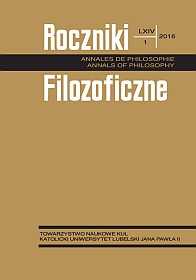Saul Smilansky’s Problems with Petitionary Prayer: Some Critical Remarks
Abstract
This paper takes a Thomistic point of view to critically analyze several points of Saul Smilansky’s article on petitionary prayer. The most controversial aspects of Smilansky’s paper are as follows: 1. It seems that the author has some difficulties with the principle of double effect, because his understanding of the human right to self-defense is highly debatable. 2. The author fails to appreciate the role of just punishment. 3. Apparently, Smilansky doesn’t know or doesn’t accept the theology of God’s permission which narrows his view of the cases he discusses. 4. His psychological account of petitionary pray is far from convincing. Generally speaking, although the title cites petitionary prayer as its central problem, in fact the main controversies refer to moral questions which can be discussed without introducing the concept of God’s agency. In order to solve Smilansky’s paradoxes we should first answer these fundamental moral difficulties.
References
Sancti Thomae Aquinatis Opera omnia iussu impensaque Leonis XIII P.M. edita, t. 4–5: Pars prima Summae theologiae (Romae: Ex Typographia Polyglotta S. C. de Propaganda Fide, 1888–1889).
Smilansky, Saul. „O wątpliwej wartości moralnej pewnych rozpowszechnionych form modlitwy”, przeł. Marcin Iwanicki. Roczniki Filozoficzne 63 (2016), 1: 7–16. DOI: 10.18290/ rf.2016.64.1-1.
Copyright (c) 2016 Roczniki Filozoficzne

This work is licensed under a Creative Commons Attribution-NonCommercial-NoDerivatives 4.0 International License.





